Calling all small business owners: Phone calls still matter in 2022
By Gabe Freis September 12, 2022
Don’t like picking up the phone? You’re not alone. A lot of people — including countless business owners — ignore or avoid phone calls.
After all, there are plenty of other ways to communicate with the people you want to reach.
But don’t neglect the phone as a channel for growing your business, either.
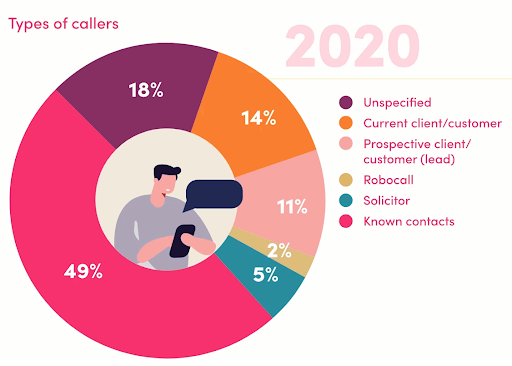
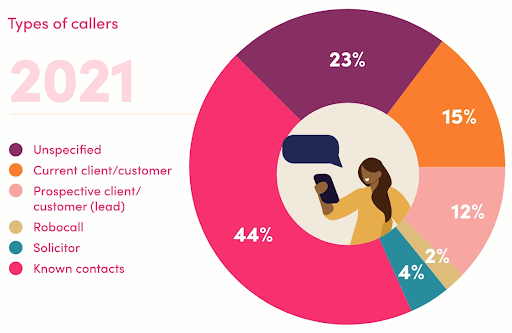
With the exception of robocalls and solicitor inquires, most calls (92%) represent opportunities — opportunities to win, retain, or lose business, improve perceptions, strengthen connections, and much more.
That’s what we learned recently when we started researching Ruby’s first-ever call trends report.
We analyzed two years’ worth of phone calls that Ruby had answered for our small business customers — over 25 million calls in total — to determine what the phone really means for businesses in the 2020s.
What we found might come as a surprise, especially for those of us who use our mobile devices for everything other than their original purpose.
Here are some of the most important things we learned.
Phone calls matter more than ever.
In our increasingly remote, automated world, a live conversation between two people is a powerful and special thing.
Perhaps that’s why more and more people are reaching out to businesses over the phone. They want to learn about products and services, ask questions, voice their concerns, and have their needs met in a personal and immediate way.
Sometimes, they don’t want to Google for hours or wait for an email or social media response. They want to talk to a real person, right now — and a phone call is the easiest way to make it happen.
So don’t fear spam phone calls, or of wasting your time the next time your business phone rings. That’s probably a real, live customer calling. They want to do business with you.
More and more people expect businesses to be available 24/7.
Even though callers’ schedules have changed during the Covid era, a lot of business still happens during, well, business hours.
According to the call trends report:
- The days with the highest volume of calls are Monday and Tuesday
- Most calls come in between 12pm and 5pm Eastern Time
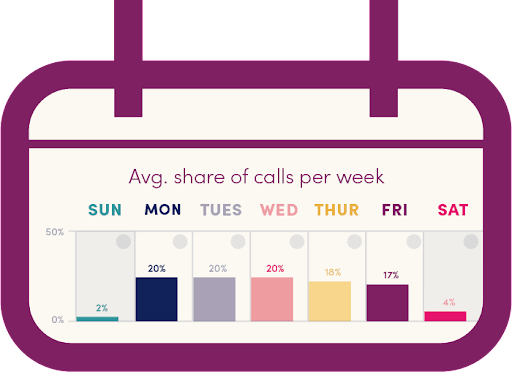
That said, there’s no denying a change is taking place. Calls outside of traditional operating hours are becoming more frequent, increasing by more than 18% from 2020 to 2021.
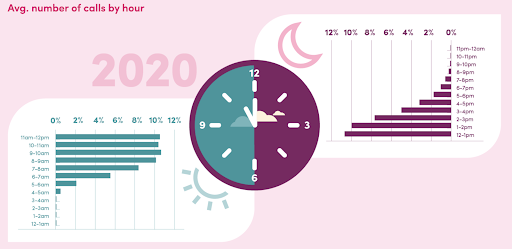
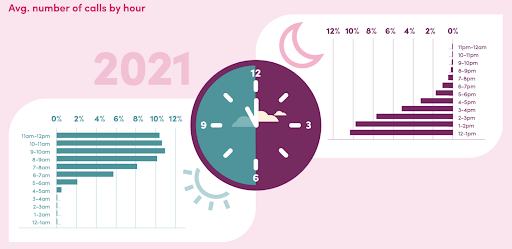
For these reasons, an investment in support beyond typical working days and hours could be a smart business decision.
Every call has the potential to impact your bottom line.
People call businesses for lots of reasons. Sometimes they simply want to learn about something or ask a question; other times, they have a specific goal in mind—such as scheduling an appointment, reaching a specific person, or engaging in a transaction.
Whatever the reason they’re calling, a caller is almost always hoping to reach a capable, friendly person on the other end.
When a business doesn’t provide this, the number of frustrated callers is likely to increase.
And that’s bad news.
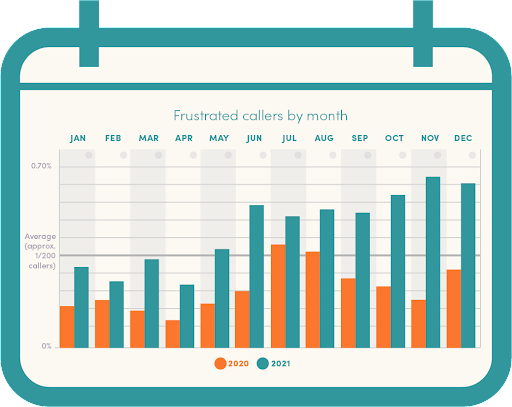
Currently, about one in every 200 callers is frustrated—and that number is on the rise. This is likely due to pandemic-related issues such as product and labor shortages, business closures, and more. Unfortunately, given ongoing socioeconomic instability, the trend isn’t likely to stop or slow down soon.
But even if frustrated callers make up a fraction of all the calls your business receives, that doesn’t change the outsized impact they have on your bottom line. After all, if even one customer has a really bad experience, that can lead to negative word of mouth, a bad public review, and possibly even long-term reputational damage.
At the same time, we are also seeing an increase in year-round calls in conventionally “seasonal” industries such as education, automotive, home services, and financial service. This indicates consumers are leaning on businesses for ongoing services and consultative relationships rather than one-off sales.
This means each call you answer doesn’t just represent one sale: It could represent a long-term relationship with a customer or client who could bring in tens of thousands of dollars in revenue, plus referrals from their friends and family.
Phone calls are a major opportunity for small businesses to win and retain business.
Calls are also a critical tool for lead generation.
And that’s not including existing customers or clients, or others whose experiences are vital to a business’s success through retention and word of mouth.
The fact is that every call is an opportunity for an organization to stand out, make a positive impression, and win loyalty—or lose business and trust.
Hopefully, you’re now a little more willing to pick up the phone than you were before. But if you’d like to learn even more about the impact phone calls can have on your business, take a look at Ruby’s call trends report for yourself.
 87% off ends soon!
87% off ends soon! 
